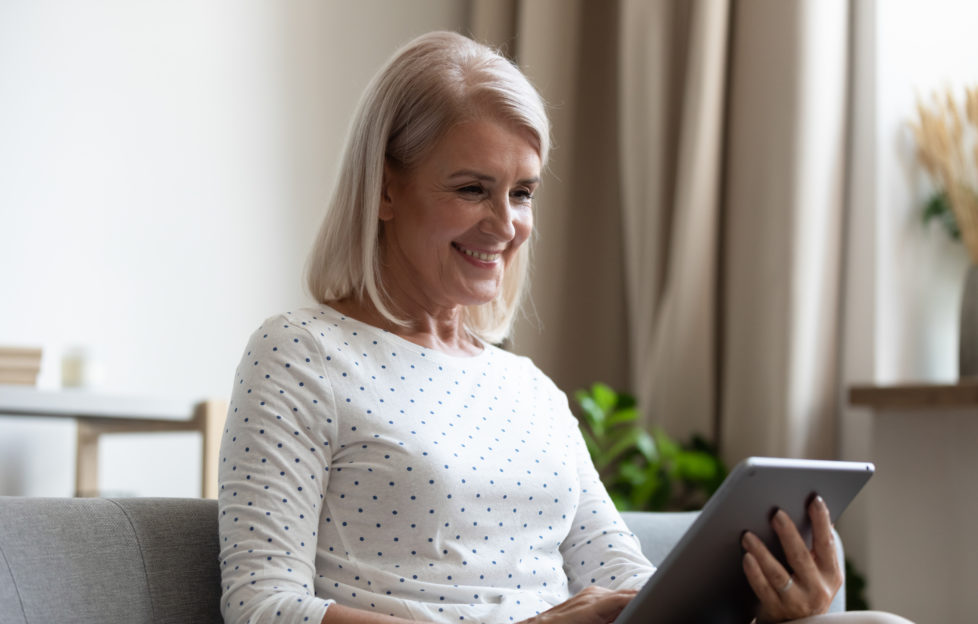Top Tips For a More Flattering Video Call

VIDEO conferencing calls are being linked to a rise in people booking cosmetic surgery consultations, experts at Transform Hospital Group say.
Dr Asher Siddiqi, medical aesthetic expert at Transform Hospital Group, said: “With cameras being the main way we’re communicating with loved ones and work colleagues, people are looking at their own faces now more than ever have before. Many people are saying that during meetings they can’t stop looking at their face on the screen or that they ‘didn’t realise their nose was so big’, that they ‘look so tired’ or that they ‘had so many wrinkles around the eyes’. We’re
Transform’s 7 top tips to a more flattering video call:
Look at your lighting:
Natural light is almost always the most flattering, however it’s important to know where it is hitting. The best position is to face a window so the light hits your face. Try to avoid harsh spotlights where you can and if you’re calling in the evening, use a full light as lamps tend to only light half your face.
Get the right angle:
We’ve all experienced the horror at turning on the camera on your laptop or phone and seeing a screenful of chins. This is usually caused by your screen being too low, so try using some books or magazines to boost it up to eye level.
Get a good night’s sleep:
We all know that we don’t look and feel our best when we’ve not had enough sleep. Our skin can look grey, our eyes look puffy and we can have dark rings around our eyes from a build-up of fluid. Our bodies repair themselves when we they’re asleep, so it is vital we get enough – the NHS recommends between six and nine hours. Not getting enough sleep can cause some skin conditions to worsen as it can cause a rise in cortisol – a stress related hormone – which is also linked to inflammation and breakdown of collagen. It can also cause conditions such as psoriasis and eczema to worsen too. To prevent fluid from building up around your face, which can often give it a puffy appearance, try sleeping on your back with your head slightly elevated above your body.
Don’t forget your SPF:
There is a myth that sunscreen should only be worn when you’re outside – but this couldn’t be further from the truth. Many people come to see us with skin concerns such as wrinkles and fine lines, which while they are brought on by the ageing process, are often accelerated due to sun exposure. Just because we are spending a lot of time indoors at the moment does not mean that we are protected from the sun – especially if we are sitting close to windows, as the sun’s harmful UV rays can penetrate them. We recommend wearing a high factor such as SPF 50 or a minimum of SPF 30 to protect the skin and help stop premature skin ageing.
Try to leave the house at least once a day:
Leaving the house, if only for a quick walk, not only does wonders for our mental health but can help give our skin a boost too. That’s because we’re able to top up on vital Vitamin D which our body is able to produce when it is exposed to sunlight. Vitamin D helps us maintain healthy bones, teeth, muscles and skin and can also help our immune system which, in turn, will help us feel our best in our day-to-day lives.
Have a well-balanced diet:
A well balanced diet, made up of all the food groups, vitamins and minerals we need will help boost our health and make our skin glow. While many people also often try to avoid fat in their diet if they are watching their weight, it’s important to know that not all fats for us are bad. Essential fatty acids which are found in foods like oily fish, avocado and nuts can help contribute to the repair and moisture levels of our skin – so make sure you’re getting enough particularly if you’re prone to dry or flaky skin.
Drink plenty of water:
Making sure we are all staying well hydrated is essential, not only for the functioning of our bodies, but also to help our skin stay in a good condition. Our skin is the body’s largest organ and it is mostly made up of water, so without this vital fluid it can’t function at its best. Without enough water our skin can become dry, dull, flaky and even more prone to ageing – that’s because water helps keep the skin’s elasticity and helps it to remain plump, which in turn helps reduce fine lines and wrinkles. Drinking plenty of water throughout the day – six to eight glasses as recommended by the NHS or more if you’re doing at home workouts – is an easy step we can all take and one that your skin will really thank you for.
For more information or to find out about discounts available through the Transform Me loyalty club visit www.transforminglives.co.uk




